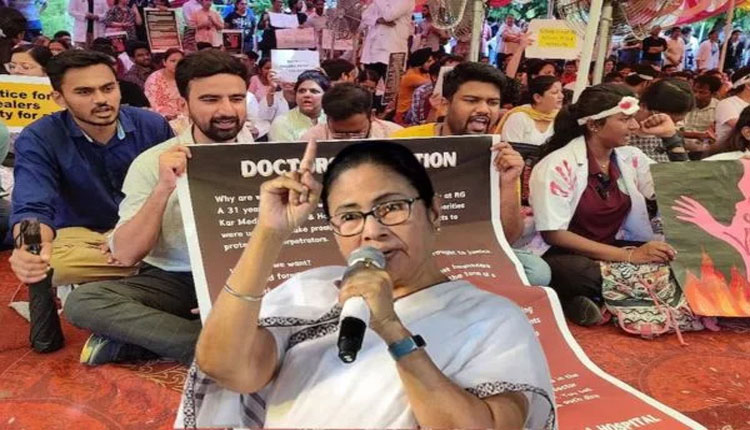Kolkata: The state of West Bengal is reeling from a series of heinous crimes, including the rape and murder of a Class IV girl in Kultali, South 24 Parganas district, and the assault on a lady doctor at RG Kar Medical College and Hospital in Kolkata. These incidents have intensified political tensions, leading to widespread protests and demands for accountability against the Mamata Banerjee-led government.
The mutilated body of the young girl was discovered in Kultali, prompting immediate outrage and sorrow across the state. The deceased’s family has alleged that their daughter was brutally raped and murdered, sparking renewed calls for justice and stringent action against the perpetrators. Police have apprehended one of the accused individuals in connection with the case, yet the community remains deeply disturbed by the recurrence of such brutal crimes.
Amid the festivities of Durga Puja, the state’s major festival, Chief Minister Mamata Banerjee finds herself under intense scrutiny and criticism. Opposition parties have seized the opportunity to demand her resignation, citing the recent spate of violent incidents as evidence of her administration’s failure to ensure public safety.
The Calcutta High Court has also weighed in on the matter, expressing dissatisfaction with the police’s handling of the cases. Justice Tirthankar Ghose ordered the transfer of the Kultali rape and murder case to a POCSO (Protection of Children from Sexual Offences) court, questioning why the police did not initially register the case under the POCSO Act despite indications of sexual abuse in the Surathal report. He further mandated that the post-mortem examination be conducted at Kalyani JNM Hospital by AIIMS experts, rather than at a government hospital under state police control, addressing the family’s concerns about impartiality.
During an urgent hearing presided over by Chief Justice T S Sivagnam, the state argued that it lacks the authority to mandate autopsies at central hospitals. Major Vijay from the Command Hospital informed the court that their facility does not house forensic experts, prompting the judge to endorse the use of AIIMS professionals for the autopsy. The court also ordered that the post-mortem be conducted in the presence of a Baruipur judicial magistrate to ensure transparency.
The Advocate General assured the court that all provisions of the POCSO Act would be duly incorporated into the case, emphasizing the victim’s age of 10 years and the necessity of applying stringent legal measures to address the crime adequately.
In response to the escalating situation, Mamata Banerjee addressed the media, expressing her frustration over the spread of fake videos and media trials that tarnish the reputations of rape victims. “Crime is crime,” she stated firmly, advocating for the registration of the incident as a POCSO case and demanding swift punishment for the guilty within three months. She also highlighted the negative impact of harmful content on platforms like YouTube, asserting that children are learning undesirable behaviors from such videos.
State BJP president Sukanta Majumdar has been vocal in his criticism of Mamata Banerjee, highlighting another recent incident where a housewife was abducted and brutally raped in Patashpur, East Midnapore. Majumdar condemned the current state of women’s safety in Bengal, questioning whether Mamata Banerjee can ensure the protection of women. “If she can’t ensure the safety of Bengal’s women, she should immediately resign as a failed chief minister,” he declared, intensifying the political pressure on the Chief Minister.
The ongoing incidents and the resultant political fallout have cast a shadow over the state, raising urgent questions about law enforcement efficacy and the government’s commitment to safeguarding its citizens. As the community grapples with grief and anger, the demand for comprehensive reforms and effective policing remains paramount to restoring public trust and ensuring justice for the victims.



Comments are closed.